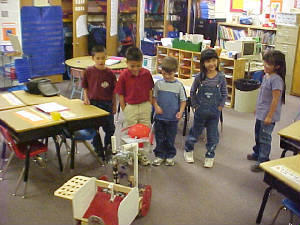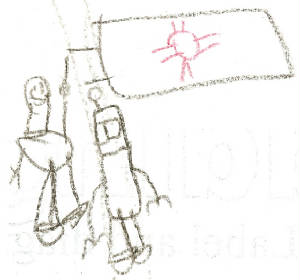|
Fundraising
The science program at DHS is no stranger to fundraising;
we've had to do a lot of it over the years. Unfortunately, in past years this was taken care of largely by our sponsor, Mr.
Goodgame. His departure last year gave the team an opportunity to accept a challenge: learn how to do everything without him!
Of course, we found new sponsors but we also found ourselves doing a lot more work.
As you may know, our team has gone to Nationals
in Texas every year that we've competed, and we didn't want to give it up this year! In the Intel/BEST portion of the competition
in Las Cruces, we placed second: we qualified for Nationals, but we had to raise all of the money ourselves if we wanted to
go!
We sold Krispy Kreme Donuts at one point to raise money
for our trip. We went to businesses, family members, friends, coworkers...anyone we could to sell some more donuts! This fundraiser
was rather successful, and very tasty.
We also asked businesses in the community to sponsor
us. This is a reason we are glad to live in a rather small town, because in general, the people are friendly and willing to
help us out.
Community Involvement:
We always try to involve our community as much as we
can, especially the younger generations. We have gone to elementary schools, included our younger siblings, and did as much
as we could to get younger students interested in BEST, this year and past years.

|
| Involving younger kids, letting them drive the robot in past years |
Recruiting:
Although the school secretaries sent out announcements
over the intercom each morning, encouraging students to join BEST, a lot of the most successful recruiting was done by "word-of-mouth."
All of the veterans told their friends to join, and their friends told their friends....well, you get the point.
We targeted advanced science classes, because those are
usually the type of students that would enjoy doing BEST. However, we didn't leave anyone out! We gladly welcomed anyone who
was interested, even if they couldn't tell a servo from a motor mount. As explained on the "Teamwork" page, each student was
worked to his or her strengths, and no one was left out!
Public Relations:
Our main contact at the Deming Headlight, our town's
newspaper, was Kevin Buey. We contacted him and received newspaper appearances, which we've discovered is a great way also
to let the community know what we're doing. We also have a radio station, and they let everyone know about our upcoming events
and competitions.
Practices:
Most of our team worked on their assignments a lot, but
we didn't have a lot of practices when the whole team was there. Because we're divided into mini-teams, they met on their
own to work specifically on their project.
The builders could always be found in the lab, along
with our website builders. They were at their machines what seemed like every waking hour! Without our team's dedication,
we wouldn't be as good as we are, so apparently all of those sleep-deprived nights were well worth it!
The spirit team, also very dedicated to their task, could
always be seen covered in paint and making noise. Obviously, we chose the right people for that job! Notebook, presentation,
and speech teams were almost never seen. They were always locked away doing their thing, and it came out great in the end!
So without these focused, determined recluses, these projects would have been in sad shape.
Although we didn't have conventional practices, it worked
well for our team. Everyone had a schedule that fit them, and the end product was worth the deviation from the norm.

|
| A picture drawn by the 5-year-old brother of one of the team members |
Meetings:
Meetings were called to let the team know what was going
on, all at once. At first, we had them once a week to start getting ideas and to start dividing ourselves into the mini-teams,
and after that we met only when we needed to.
Mentorship:
One of the most important parts of DHS BEST is
training, teaching, and helping the younger "generations" so they can still build an awesome robot when the older students
graduate. It took a lot of patience and time, but this is something we make sure to focus on every year. Without successors,
our team would die out! We also try to recruit more people each year to get them ready and experienced for next year's
challenge.
|

